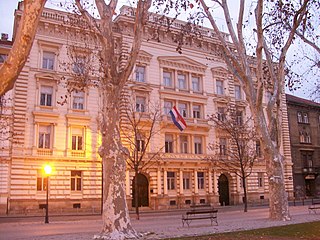The politics of Croatia are defined by a parliamentary, representative democratic republic framework, where the Prime Minister of Croatia is the head of government in a multi-party system. Executive power is exercised by the Government and the President of Croatia. Legislative power is vested in the Croatian Parliament. The Judiciary is independent of the executive and the legislature. The parliament adopted the current Constitution of Croatia on 22 December 1990 and decided to declare independence from Yugoslavia on 25 May 1991. The Constitutional Decision on the Sovereignty and Independence of the Republic of Croatia came into effect on 8 October 1991. The constitution has since been amended several times. The first modern parties in the country developed in the middle of the 19th century, and their agenda and appeal changed, reflecting major social changes, such as the breakup of Austria-Hungary, the Kingdom of Serbs, Croats and Slovenes, dictatorship and social upheavals in the kingdom, World War II, the establishment of Communist rule and the breakup of the SFR Yugoslavia.
Separation of powers refers to the division of a state's government into "branches", each with separate, independent powers and responsibilities, so that the powers of one branch are not in conflict with those of the other branches. The typical division into three branches of government, sometimes called the trias politica model, includes a legislature, an executive, and a judiciary. It can be contrasted with the fusion of powers in parliamentary and semi-presidential systems where there can be overlap in membership and functions between different branches, especially the executive and legislative. In most non-authoritarian jurisdictions, however, the judiciary almost never overlaps with the other branches, whether powers in the jurisdiction are separated or fused.
The judiciary of Germany is the system of courts that interprets and applies the law in Germany.

The Constitution of the Republic of Croatia is promulgated by the Croatian Parliament.

The Supreme Court of Ireland is the highest judicial authority in Ireland. It is a court of final appeal and exercises, in conjunction with the Court of Appeal and the High Court, judicial review over Acts of the Oireachtas. The Supreme Court also has appellate jurisdiction to ensure compliance with the Constitution of Ireland by governmental bodies and private citizens. It sits in the Four Courts in Dublin.
The judicial system of Ukraine is outlined in the 1996 Constitution of Ukraine. Before this there was no notion of judicial review nor any Supreme court since 1991's Ukrainian independence when it started being slowly restructured.

The Constitutional Court of the Republic of Croatia is an institution that acts as the interpreter and guardian of the Croatian Constitution and which monitors the conformity of laws with the Constitution as well as protection of human rights and freedoms of citizens that are guaranteed by the Constitution. It is considered to be de facto the highest judicial authority because it can overturn Supreme Court decisions on the basis of constitutional breaches. It is not considered as being part of the judicial branch of government, but rather a court sui generis, and it is therefore often colloquially referred to as a "fourth branch of government", alongside the traditional model of tripartite separation of powers into the executive, legislative (Parliament) and judicial branches.

The Supreme Court of the Republic of Croatia is the highest court in the country, which ensures the uniform application of laws and equal justice to all.

The Supreme Court of Sri Lanka is the highest court in Sri Lanka and the final judicial instance of record. Established in 1801 and empowered to exercise its powers subject to the provisions of the Constitution of Sri Lanka, the Supreme Court has ultimate appellate jurisdiction in constitutional matters and takes precedence over all lower courts. The Sri Lankan judicial system is a complex blend of common law and civil law. In some cases, such as those involving capital punishment, the decision may be passed on to the President of Sri Lanka for clemency petitions. The current Chief Justice of Sri Lanka is Jayantha Jayasuriya.

The General Council of the Judiciary is the national council of the judiciary of Spain. It is the constitutional body that governs all the Judiciary of Spain, such as courts, and judges, as it is established by the Spanish Constitution of 1978, article 122 and developed by the Organic Law 6/1985 of the Judicial Power (LOPJ). The President of the CGJP is also the president of the Supreme Court.

A supreme court is the highest court within the hierarchy of courts in most legal jurisdictions. Other descriptions for such courts include court of last resort, apex court, and highcourt of appeal. Broadly speaking, the decisions of a supreme court are not subject to further review by any other court. Supreme courts typically function primarily as appellate courts, hearing appeals from decisions of lower trial courts, or from intermediate-level appellate courts.

The judiciary of Portugal is a system of courts that together constitute one of the four organs of Sovereignty as defined by the Portuguese Constitution. The courts are independent from the other three Portuguese organs of Sovereignty.

The Supreme Court is the highest court in the Kingdom of Spain. Originally established pursuant to Title V of the Constitution of 1812 to replace —in all matters that affected justice— the System of Councils, and currently regulated by Title VI of the Constitution of 1978, it has original jurisdiction over cases against high-ranking officials of the Kingdom and over cases regarding illegalization of political parties. It also has ultimate appellate jurisdiction over all cases. The Court has the power of judicial review, except for the judicial revision on constitutional matters, reserved to the Constitutional Court.

The judiciary of Somalia is defined by the Provisional Constitution of the Federal Republic of Somalia. It stipulates that the national court structure is to be organized into three tiers: the Constitutional Court, Federal Government level courts, and Federal Member State level courts. A future nine-member Judicial Service Commission is empowered to appoint any federal tier member of the judiciary. It also selects and presents potential Constitutional Court judges to the House of the People of the Federal Parliament for approval. If endorsed, the President then appoints the candidate as a judge of the Constitutional Court. The five-member Constitutional Court is likewise empowered to adjudicate issues pertaining to the constitution, in addition to various federal and sub-national matters.

The Supreme Court, earlier known as the Supreme Court of Cassation, is the court of last resort in the Republic of Serbia. It is the court of cassation which reviews and possibly overturns previous rulings made by lower courts. It was established in 1846 by a decree of Prince Aleksandar Karađorđević. In the last 160 years since it was established, the Court has asserted its authority within judiciary in Serbia and beyond. The Supreme Court is today authorized by the Constitution of Serbia and the Law on Organization of Courts.
The judiciary of Somaliland is the judicial branch of the Somaliland government.

State's Attorney Office of the Republic of Croatia is an autonomous and independent judicial body empowered and duty-bound to instigate prosecution of perpetrators of criminal and other penal offences, to initiate legal measures to protect the property of the Republic of Croatia and to apply legal remedies to protect the Croatian Constitution and laws.
Dinko Cvitan is a Croatian lawyer who served as an Attorney General of Croatia between 24 April 2014 and 20 April 2018, had previously served as director of the Croatian State Prosecutor's Office for the Suppression of Organized Crime and Corruption.

The State Judicial Council or DSV is the national council of the judiciary of Croatia. It ensures the autonomy and independence of the judicial branch in the Republic of Croatia by autonomously deciding on the appointment, promotion, transfer, dismissal and disciplinary accountability of judges and presiding judges.

The judiciary is one of the three branches of state that make up the government of the Dominican Republic. Its function is to administer justice, for free, to decide on disputes between individuals or corporations, private or public, in every type of process, judgment and execution of judgment. They exercise for the courts and tribunals established by the Constitution and the law















